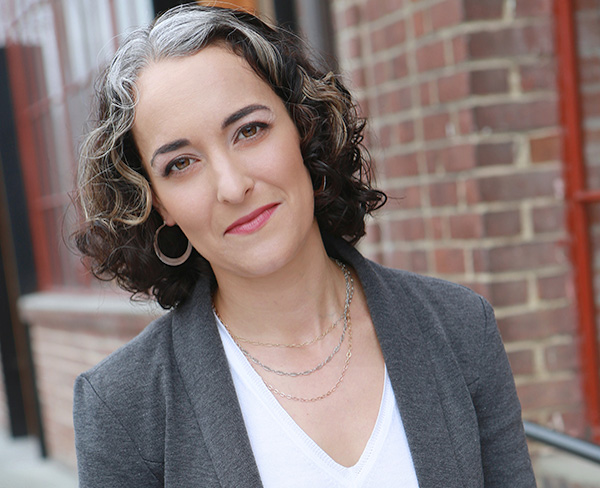Keramet Reiter helps build in-prison education programs in California

Keramet Reiter also has appeared on the ABA Journal's Modern Law Library podcast to discuss her book "23/7: Pelican Bay Prison and the Rise of Long-term Solitary Confinement." (Photo by Kirsten Lara Getchell)
Keramet Reiter has spent countless hours inside prisons, working with individuals who are incarcerated and studying the impact of prison and punishment policies on them, their communities and the legal system.
As part of her work, Reiter has focused on expanding access to in-prison education programs. She says these programs are highly effective, as several national studies show educating incarcerated individuals has societal and economic benefits.
One often-cited study released by the Rand Corp. and supported by the U.S. Department of Justice found that every dollar invested in prison education reduces incarceration costs by as much as $5 in the first three years after release, when many who leave prison are most likely to return. The same study noted that individuals who participate in education programs were 43% less likely to reoffend.
“There is growing consensus that what we were doing with incarceration before wasn’t working and that this is an alternative that has incredibly high efficacy,” says Reiter, a professor of criminology, law and society at the University of California at Irvine. “Other studies that have been done around this suggest people who earn a bachelor’s degree in prison have recidivism rates approaching zero.”
Building on this success, Reiter co-founded Leveraging Inspiring Futures Through Educational Degrees, the first in-prison bachelor of arts program in the University of California system. LIFTED, as it’s known, enables individuals who received an associate degree in sociology through another prison education program to transfer to the University of California at Irvine as juniors and earn their bachelor’s degree.
The University of California at Irvine announced its plans for LIFTED in fall 2020; two years later, the first cohort of 25 students at the Richard J. Donovan Correctional Facility in San Diego began taking classes. Reiter says every student is expected to graduate next spring.
“Even if it’s 24 out of 25, those are pretty amazing retention and completion numbers,” says Reiter, LIFTED’s director. “It’s on a really positive course … and we hope it’ll become an integral part of higher education in the state.”
Becoming an advocate
Reiter always has been interested in social justice and education.
Growing up in Georgia and Florida, she learned a lot from her parents, who served in the Peace Corps in Turkey and Thailand in the 1960s. (She says people often ask about her first name—it’s Turkish.)

As an undergraduate at Harvard University, Reiter wanted to volunteer and discovered some friends were involved in tutoring programs at nearby correctional facilities. She joined in, initially helping kids at a youth detention center with homework and then moving to an adult jail. She later assisted the local chapter of the American Friends Service Committee, which advocated against solitary confinement in prisons.
“I had never really thought about prisons before,” Reiter says. “I had never thought about what happened to people when they got punished. And I just kept being shocked by what I saw.”
Reiter, who studied social studies and Near Eastern languages and civilizations, began focusing on prison policy. After graduating in 2003, she worked at the Prison Law Office in Berkeley at California, and Human Rights Watch in New York City.
While in New York, Reiter earned a master’s degree from the John Jay College of Criminal Justice and helped establish a tutoring program on Rikers Island. She also applied to law school, motivated by lawyers around her who were using their skills to inspire change.
“In my work, I kept being surprised by what we didn’t know,” says Reiter, who enrolled in the University of California at Berkeley School of Law and its Jurisprudence and Social Policy doctoral program. “I was at Human Rights Watch when the juvenile death penalty was declared unconstitutional. We wanted to find out how many kids had been sentenced to life without parole, thinking of that as the next step around advocacy. But at the time no one knew, and it was shocking because those are basic statistics.”
“So I’ve always been really interested in what kinds of social science information, what kinds of data, can we gather that helps us think about litigation and policy trajectories in the law?” she adds.
Reiter earned her JD in 2009 and her PhD in 2012, while also helping with a college program at San Quentin State Prison. She joined the University of California at Irvine, where she teaches in the Department of Criminology, Law and Society and its law school.
Megan Wachspress, a staff attorney at the Sierra Club, met Reiter in the PhD program and volunteered with her at San Quentin. She describes Reiter as “incredibly clear-eyed” and contends she advocated for criminal justice reform long before many in the field.
“It took a ton of moral clarity and real interpersonal courage to stake out that no, [the prison system] is unacceptable and it needs to change, and to devote her time and effort to things like prison education,” Wachspress says.
Roots of LIFTED
LIFTED largely became possible because of California’s investment in higher education in its correctional facilities.
In 2014, the state started providing funding to community colleges that offer incarcerated individuals the chance to earn an associate degree. Within a few years, Reiter says, all the state prisons had in-person programming. California State University also began offering bachelor’s degree classes.
Reiter felt encouraged by these developments and wanted the University of California system to join the efforts.
“For those of us who really believe in the mission of the UCs to make professional and graduate degrees accessible to diverse student bodies, it seemed really intuitive to have the UCs involved in the higher education space in prison,” says Reiter, who began working with colleagues to develop LIFTED in 2018. “UC Irvine is a minority-serving institution, so it also really resonated with a lot of the administration on this particular campus.”
LIFTED—which now has two cohorts of students—is available to individuals at the Richard J. Donovan Correctional Facility who earned an associate degree in sociology through nearby Southwestern College. Once accepted, students take in-person classes from University of California at Irvine faculty while serving their sentence or on campus if they are released before finishing the program.
Reiter has begun meeting with LIFTED’s third cohort of students, who will start classes in fall 2024. She also is developing the next phase of LIFTED, which includes replicating the program at other University of California campuses.
Sharing the work
Reiter shines a light on prisons and the conditions inside them in many other ways.
Among them, she helped create PrisonPandemic, a digital archive that preserves the stories of individuals who live, work or have family members in California prisons and jails. Since the beginning of the COVID-19 pandemic, they have collected and posted online thousands of letters and messages, and more than 500 recorded phone calls.
“One of the things I loved about PrisonPandemic was it really was people coming to us and saying, ‘Can you help us share our stories?’ And we just shared those stories,” Reiter says. “That’s a really interesting model for both creating transparency and creating resources that are driven by the people experiencing this situation.”
Reiter has long co-chaired the ABA Criminal Justice Section Corrections Committee. Its members recently helped draft a resolution urging governments to stop using stigmatizing labels for individuals in the criminal justice system. The House of Delegates adopted the measure at the midyear meeting in February.
W. David Ball, a criminal justice professor at the Santa Clara University School of Law and the committee’s other co-chair, recruited Reiter for the position after years of following her “groundbreaking, class-leading scholarship” on solitary confinement and other issues.
“She’s not just someone who reads cases and views things from afar, but she is in prison a lot of the time,” Ball says. “I thought, ‘Wouldn’t it be great for me to get to work with her closely so I can learn from her and exchange ideas with her?’ That has really proven to be the case.”
Reiter, who lives in Long Beach with her partner and 5-year-old son, says her work began because of her interest in education, but she continues to be drawn to prisons because they magnify other problems, including inadequate health care and racial inequalities.
“If one is interested in social justice and equality and more just institutions, prisons are a really interesting place to see problems more clearly and think about ways to relate to them with individuals who have often had a lot of time to think about those things and see them differently,” she says.
See also:
“Is it time to rethink solitary confinement?”
Members Who Inspire is an ABA Journal series profiling exceptional ABA members. If you know members who do unique and important work, you can nominate them for this series by emailing [email protected].



